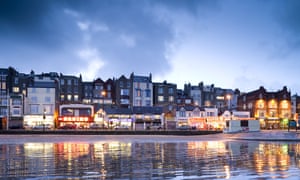Earthquake strikes off North Yorkshire coast
Magnitude 3.8 earthquake occurred at depth of 11 miles about 93 miles off the coast of Scarborough - but few people noticed

One of the largest earthquakes to hit Britain for almost a decade was felt off the coast of North Yorkshire on Tuesday night – but most residents appear not to have noticed.
The magnitude-3.8 tremor happened in the North Sea almost 100 miles east of Scarborough at 6.50pm, the British Geological Survey (BGS) said.
Bemused residents expressed surprise that there had been an earthquake.
The North Sea tremor had a depth of 11 miles and struck 93 miles off the Scarborough coast – but appears not to have caused any damage to buildings on the mainland.
The news prompted residents and Twitter users to poke a little gentle fun at the Yorkshire seaside town, famed for its sandy beach, medieval castle and plethora of arcades.
Ol Crabtree(@OlCrabtree)
Scarborough earthquake causes £10,000 worth of 10ps to fall off their ledge and means 100s of whack-a-moles need to re-housed #earthquakeJanuary 4, 2017
Geography Dept(@SS_Geography)
North Yorks council give all clear after earthquake. No tsunami waves spotted by experts in Scarborough. Bingo to resume ASAP @BBCLookNorthpic.twitter.com/1BxYQboEC0January 4, 2017
Carl Jones(@CarlDJones)
Harrowing images of Scarborough Castle following the 3.9 earthquake tonight. Hard to believe that, only yesterday, this was a Travelodge. pic.twitter.com/zRyR9ISt4rJanuary 3, 2017
And the folks at entertainment venue Scarborough Spa allayed any fears of mass devastation on the Yorkshire coast when it tweeted on Wednesday morning:
Scarborough Spa(@scarboroughspa)
Earthquake? We're still here! #BrightAndBreezypic.twitter.com/bT6qrKH21fJanuary 4, 2017
When asked whether anyone at the venue felt the quake, the Scarborough Spa added:
Scarborough Spa(@scarboroughspa)
@JoshHalliday Hi Josh! We haven't heard of anyone that felt it. Too far away, maybe?January 4, 2017
Other residents simply pointed out a possible logical reason why they did not feel the tremor: “I live 50 metres from the North Sea and didn’t feel the 3.9 Scarborough earthquake because it was 100 miles out to sea,” said one.
Another added: “In case you were wondering, we never felt the earthquake. Life is just boringly normal.”
At the most, residents reported hearing only a “funny noise” when the rare earthquake struck.
About Scarborough(@aboutScarboroUK)
A 3.9 mag #Earthquake has struck 100miles off coast of #Scarborough. It happend at 6:50pm local time. I did hear a funny noise?January 3, 2017
Experts at the BGS said earthquakes on the east coast of the UK were relatively rare, saying: “Earthquakes are almost completely absent from eastern Scotland and north-east England. Similarly, Ireland is almost completely free of earthquakes. The North Sea is more active than the mainland.”
The largest known British earthquake occurred near Dogger Bank in 1931, with a magnitude of 6.1. It was 60 miles offshore but was still powerful enough to cause minor damage to buildings on the east coast of England.
Since you’re here…
… we have a small favour to ask. More people are reading the Guardian’s independent, investigative journalism than ever but advertising revenues across the media are falling fast. And unlike many news organisations, we haven’t put up a paywall – we want to keep our journalism as open as we can. So you can see why we need to ask for your help.
The Guardian is editorially independent, meaning we set our own agenda. Our journalism is free from commercial bias and not influenced by billionaire owners, politicians or shareholders. No one edits our Editor. No one steers our opinion. This is important because it enables us to give a voice to the voiceless, challenge the powerful and hold them to account. It’s what makes us different to so many others in the media, at a time when factual, honest reporting is critical. The Guardian’s investigative journalism uncovers unethical behaviour and social injustice, and has brought vital stories to public attention; from Cambridge Analytica, to the Windrush scandal to the Paradise Papers.
If everyone who reads our reporting, who likes it, helps to support it, our future would be much more secure. For as little as $1, you can support the Guardian – and it only takes a minute. Thank you.


![[Photos] After Meghan Markle’s Hair Was Pulled In Public, Prince Harry’s Reaction Left Officials Shell Shocked [Photos] After Meghan Markle’s Hair Was Pulled In Public, Prince Harry’s Reaction Left Officials Shell Shocked](https://images.outbrainimg.com/transform/v3/eyJpdSI6ImUyZWNlZTFmZDk0ZWVkN2Y1NjM1ZmYyMDU2OTViZjg0MjM0OWJjNmNkNWFhMTgwYjZiMzUwZTExNWJhYTdlNjAiLCJ3IjoyMjAsImgiOjEzNSwiZCI6MS41LCJjcyI6MCwiZiI6MH0.webp)

![[Pics] Man Introduces His Wife To Gorillas He Raised And Things Didn't Go As Planned [Pics] Man Introduces His Wife To Gorillas He Raised And Things Didn't Go As Planned](https://images.outbrainimg.com/transform/v3/eyJpdSI6IjQ0YzVhNmQxZTZjYmI3NjUyZmQ5MzEwZmJhYTAxMDM0NGE0MjY1NDIyYWE1ZTUyNTA3ZTYwZTk5ZWM3MGFlMjQiLCJ3IjoyMjAsImgiOjEzNSwiZCI6MS41LCJjcyI6MCwiZiI6MH0.webp)

No comments:
Post a Comment
Note: Only a member of this blog may post a comment.